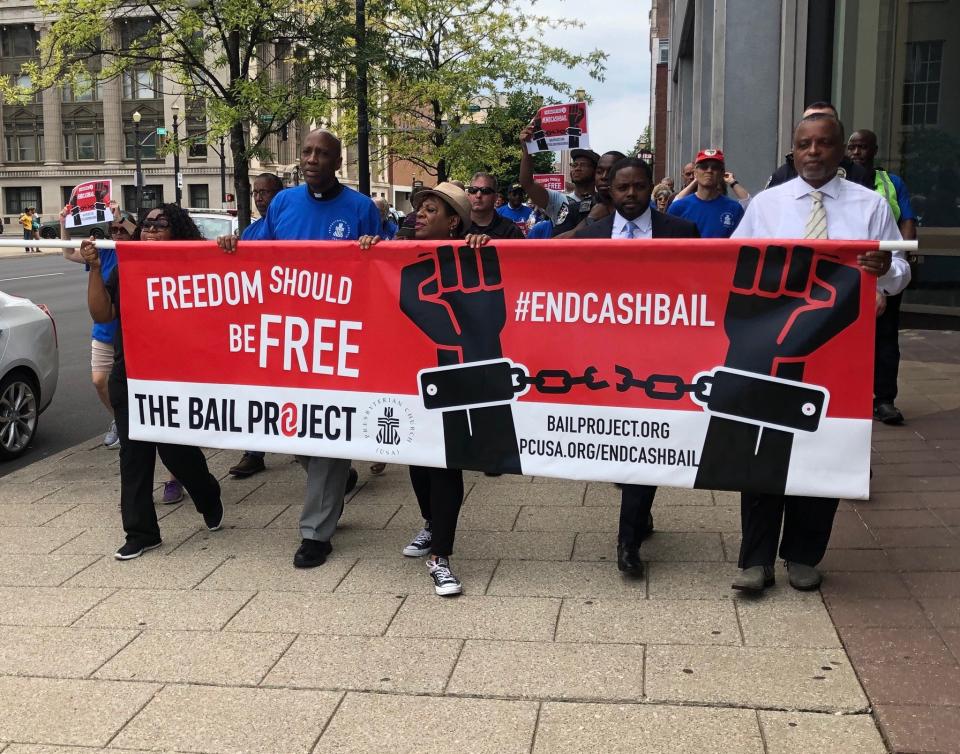Cash bail criminalizes poverty and is in desperate need of reform | Opinion
- Oops!Something went wrong.Please try again later.
Here’s a riddle: in the past 15 years, the number of people in U.S. jails has grown sharply, but the number of convictions has stayed the same. What’s going on?
The alarming answer: nearly 70% of people held in jail are there because they can’t afford bail. The crimes they’ve been charged with are often nonviolent, and bail amounts vary widely. However, even lower amounts are more than many people can pay, so individuals stay in jail until their court date for a lack of as little as $250. In America, this is called “pretrial detention,” and it can last for weeks, months and even years.
Our Constitution says a person is considered innocent until proven guilty – meaning over 450,000 legally innocent people are in jail every day simply because they’re too poor not to be. And we’re left with a two-tiered system of justice in America: one for the rich, and one for everyone else.

Money bail works like this: if you pay the bail assigned to you by a judge and return to court for your trial, your bail is refunded. For those unable to post bail, however, a system that was intended to protect public safety has come to be a device of punishment. Every day a defendant is in jail, she risks losing her job, housing, immigration status or even custody of her children. Time in jail can also be traumatic, especially for first-time offenders.
Consider Kalief Browder, who was jailed because he couldn’t pay $3,000.
Hear more Tennessee voices: Get the weekly opinion newsletter for insightful and thought-provoking columns.

That’s the bail amount set by a judge in 2010 after Browder was charged at age 16 of stealing a backpack. His family was unable to pay, so he was sent to Rikers Island, where he spent three years before prosecutors dismissed his charges. Violence and long stints in solitary confinement defined Browder’s Rikers experience. “I’m not all right,” he said in 2014. “I’m messed up.” He hanged himself in 2015. He was 22. And he’s just one of thousands who endure trauma and injustice at the hands of our bail system.
Because of the personal and professional damage defendants face in pretrial detention, the bail system drives people to plead guilty – even when they’re not. But why would someone choose to take a guilty plea if they’re innocent? Imagine for a moment it’s you stuck in that jail cell, and you don’t have the $1,000 to get out. A prosecutor offers an escape: “Just plead guilty … You can go home, back to your job. You can kiss your kids goodnight tonight.” I’d plead, too.
A system that operates without money bail is possible. Picture this: a presumption of release for all, with judicial discretion to detain offenders based on risk and criminal history. This, coupled with incentives to avoid detention for low-risk offenders and funding for evidence-backed pretrial services (such as providing reminders over text, transportation vouchers and on-site childcare), could allow Tennessee to be a leader in criminal justice reform, especially following Gov. Bill Lee’s 2021 Reentry Success Act and Alternatives to Incarceration Act.

Your state. Your stories. Support more reporting like this.
A subscription gives you unlimited access to stories across Tennessee that make a difference in your life and the lives of those around you. Click here to become a subscriber.
We’re long overdue to create alternatives to cash bail. Minimizing pretrial detention makes communities safer while simultaneously shrinking the footprint of the criminal justice system and saving taxpayer dollars. Mass incarceration starts with money bail. The path to justice starts with ending it.
Rachael Marglous is a senior at Vanderbilt University studying criminal justice policy and is also an intern with the Center for Policing Equity.
This article originally appeared on Nashville Tennessean: Cash bail criminalizes poverty and is in desperate need of reform

